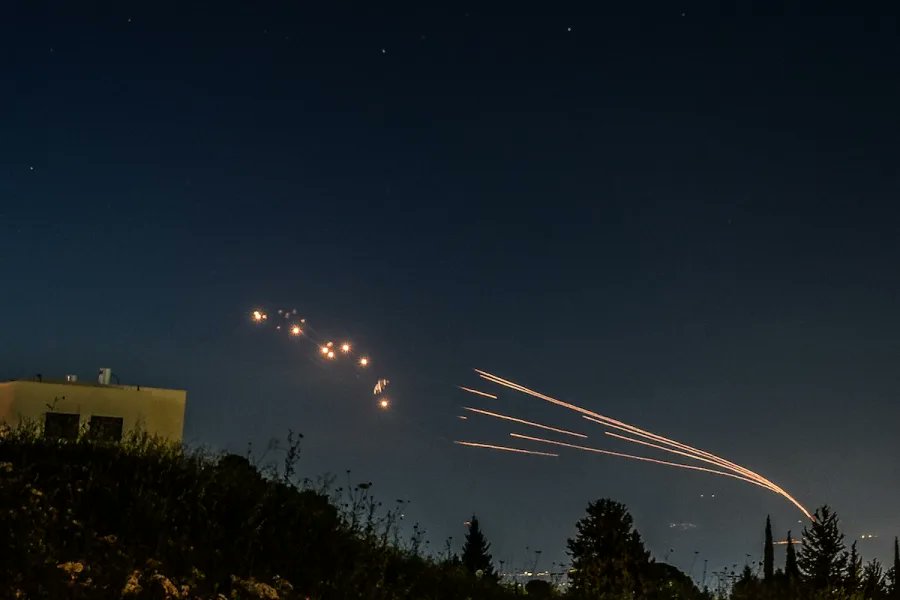
Iran's Recent Strikes Against Israel: A Calculated Strategic Move

BY - AHMED JABBER
In a development that has sent shockwaves across the region, Iran carried out unprecedented strikes against Israel on April 14, 2024, using a barrage of drones, cruise missiles, and ballistic missiles. While no casualties were reported due to Iran's judicious pre-warning, the strikes carry profound strategic implications that extend far beyond the immediate military confrontation.
Firstly, the Iranian pre-warning was not merely a humanitarian gesture to minimize collateral damage. Rather, it was a carefully calculated move aimed at sending an unambiguous message to Israel and its regional allies. By providing advance notice, Tehran demonstrated its capability to penetrate Israel's vaunted air defense systems, while simultaneously signaling its intent to exercise restraint – for now.
This restrained yet potent display of force can be interpreted as a direct response to Israel's perceived intelligence failures during the clashes with Hamas in October 7, last year.
Despite its formidable technological prowess and extensive intelligence networks, Israel found itself on the defensive against Hamas' asymmetric warfare tactics. Iran's strikes seem to underscore the message that if such an unconventional threat could catch Israel off-guard, a coordinated assault from Iran and its regional proxies armed with advanced drones, cruise missiles, and ballistic missiles could prove catastrophic.
Moreover, the timing of Iran's strikes coincides with the hijacking of an Israeli-affiliated tanker in the Persian Gulf, suggesting a coordinated campaign to exert pressure on Israel and its allies. By demonstrating its ability to disrupt vital maritime trade routes while simultaneously showcasing its missile capabilities, Iran has effectively elevated the stakes in the region's intricate geopolitical chess game.
Notably, the Iranian regime's actions may have broader strategic objectives beyond the immediate confrontation with Israel. By flexing its military muscle and engaging in high-stakes brinkmanship, Tehran could be maneuvering to regain leverage in negotiations over its sanctioned assets and the broader nuclear deal.
While the closure of airspace by many countries aided Israel's damage control efforts this time, there is no guarantee that future strikes will originate from Iranian territory. The strategic lesson underscored by these events is that if Iran's proxies in close proximity to Israel, such as Hamas and Hezbollah, were to possess similar advanced drones, cruise missiles, and ballistic missiles, the consequences could be catastrophic for the Jewish state.
As the dust settles from this audacious strike, regional powers and global stakeholders must navigate the delicate balance between deterrence and escalation. Iran's message is clear: its missile capabilities, combined with its network of proxy forces, pose a formidable threat to Israel and its allies. Whether this gambit translates into tangible concessions or further escalates tensions remains to be seen.
In the shadowy realm of clandestine operations and covert diplomacy, Iran's recent actions have rewritten the rules of engagement, forcing its adversaries to reassess their strategies and prompting a recalibration of alliances and countermeasures. As the region holds its breath, the world watches with bated breath, bracing for the next move in this high-stakes game of geopolitical chess.
Leave a comment
- Popular
- Rated
- Commented
04/11/2021 - 11:05:02
12/03/2023 - 22:58:08
22/01/2023 - 11:24:06
13/12/2015 - 09:27:08
01/03/2021 - 09:00:37
Opinions
30/04/2024 - 01:33:18
17/04/2024 - 22:46:39
08/03/2024 - 02:04:01
Politics
30/04/2024 - 01:33:18
22/04/2024 - 15:18:30
Terror Watch
29/04/2024 - 03:37:51
28/04/2024 - 02:39:40
Press Releases
18/04/2024 - 21:29:03
13/04/2024 - 10:40:06
 0
0 


































Iran's Recent Strikes Against Israel: A Calculated Strategic Move
BY - AHMED JABBER